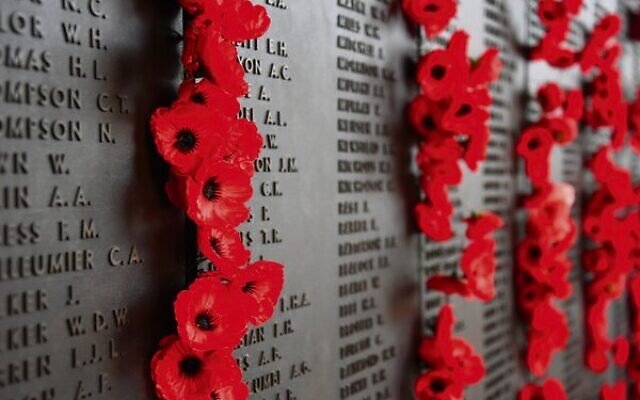Why we commemorate the past
What is the purpose of memory? Why do we recall the terrible wars, why do we mark Anzac Day and stir up agonising recollections and tortuous questions?
Time. We hold it in our hands; it’s ours to use, to create, to build, to connect.
It’s about now, this present moment, fragile, fleeting. It’s about yesterday; about memory and history, reflection and recollection. It’s about tomorrow, about the future and hope.
Jewish time is heavy with memory. We are saturated in history … our memories are longer than almost any other people. Historical consciousness defines the Jewish experience. The scholar Yosef Yerushalmi noted that the key word of the Tanach is not history but memory, or zikaron. Zachor, the command to remember, occurs over and over in the Torah.
What is the purpose of memory? Why do we recall the terrible wars, why do we mark Anzac Day and stir up agonising recollections and tortuous questions?
The reason we remember on Anzac Day, as on Yom Hashoah and Yom Hazikaron, is for the sake of the future and not the preservation of the past. It is to ensure we will not repeat the mistakes of the past. It is to affirm that we are a people of life and not death; we are here to give the world the dreams and aspirations, the actions and goodness that all those millions were prevented from. It is to say – we are here – to finish the work you were not allowed to complete.
Jews are familiar with the act of remembering, using it as a tool to build identity and as a way of connecting the past and future. We observe Pesach not only as a glorious celebration of a freedom past but as a contemporary commitment to ensuring liberty. The bitter taste of slavery enhanced our appetite for social justice and our protection of the vulnerable. The Torah repeatedly advises us to “Remember you were once slaves in Egypt,” and therefore to treat the widow, orphan and stranger with special care and consideration.
Anzac ceremonies speak directly to all Australians about the power of memory, and young Australians in particular about values and the search for identity and meaning. They bind time past to time present.
In a 1999 Anzac Day address, then senior ADF Rabbi Raymond Apple presciently noted that this day was a preamble to the making of modern Australia, that it was about “reliving the legend and re-dreaming the dream”. The dream of a nation bonded to its land, its original inhabitants and to one another in mateship, easygoing tolerance, a respect for freedom and diversity, a spirit of courage and determination, and an irreverent sense of larrikinism.
If Australia is the dream-land, the Jewish people are the dream-people. We have always “been as dreamers” (Psalm 126), intoxicated by a vision of healing a broken world and gentling a savage planet. In this country of aged dreams our ancient visions join together as we strive to create a society, based on respect, inclusion and caring – ideals that can’t be taken for granted in the current climate of extremism, polarisation and gross intolerance.
Chaplains in the Defence Force reach out, not only to members of their own faith, but are responsible for connecting to the wide diversity of members in their care. While our Jewish chaplains impart the principles and practices of Judaism to Jewish servicemen and women, they provide spiritual and pastoral support to all members of their units.
Over the past year we have recruited three new chaplains, including our first naval chaplain – Rabbi Raffi Kaiserbleuth – and our first Jewish woman army chaplain, Rabbanit Judith Levitan. Our longstanding army chaplain, Rabbi Dovid Gutnick, has been promoted to the senior role of a divisional chaplain.
Jewish chaplaincy enjoys an admirable reputation in the ADF and Jewish chaplains are highly sought after. We now have three army chaplains (including Rabbi Ari Rubin in Perth), a naval chaplain and air force chaplain, Rabbi Yossi Friedman in Sydney.
Our chaplains transmit the message of our people – the message of memory that we have refined over centuries. Our commitment to those who preceded us. We cannot bring the dead back to life but we can allow their memory enhance our lives. We can let reflection and remembrance help us to not repeat the mistakes of the past, to strengthen our commitment to reversing the dictum that all we have learnt from history is that we have not learnt from history.
Our commitment to memory is to strengthen our minds and our hearts to end the blight of war, elusive and illusionary as it may seem. We Jews and Australians are after all, the dream people. We continue to dream, aspire hope and strive to enact the vision.
Anzac Day is not about the glorification of war but the redemption of peace, not about creating better weapons but better words and worlds, not about swords and super-killer drones but ploughshares and super-peaceful apps.
We hold time in our hands, we cradle shalom in our arms, we carry hope in our hearts, we realise the possibility and potential in our actions.
Rabbi Ralph Genende OAM is senior rabbi to the ADF, Jewish Care Victoria and the Kesher Community, and author of Living In An Upside Down World.


comments